| کد مقاله | کد نشریه | سال انتشار | مقاله انگلیسی | نسخه تمام متن |
|---|---|---|---|---|
| 4959769 | 1445961 | 2017 | 37 صفحه PDF | دانلود رایگان |
عنوان انگلیسی مقاله ISI
Expert judgement for dependence in probabilistic modelling: A systematic literature review and future research directions
ترجمه فارسی عنوان
قضاوت کارشناس برای وابستگی در مدل سازی احتمالاتی: یک بررسی ادبی سیستماتیک و مسیرهای تحقیق آینده
دانلود مقاله + سفارش ترجمه
دانلود مقاله ISI انگلیسی
رایگان برای ایرانیان
کلمات کلیدی
تحلیل ریسک، مدل سازی عدم اطمینان، وابستگی، قضاوت متخصص ساختاری مدلسازی وابستگی،
ترجمه چکیده
بسیاری از برنامه های کاربردی در تصمیم گیری در حین عدم اطمینان و ارزیابی احتمالی ریسک نیاز به ارزیابی مقادیر نامطلوب چندگانه دارند، به طوری که علاوه بر توزیع های حاشیه ای، باید وابستگی متقابل را برای به درستی درک ریسک کلی مدل سازی کرد. با این وجود، اطلاعات تاریخی مربوط به اطلاعات مربوط به وابستگی اغلب در دسترس نیستند و یا به سادگی هزینه زیادی برای به دست آوردن ندارند. در این مورد، تنها گزینه منطقی این است که این عدم قطعیت را از طریق استفاده از قضاوت کارشناسان مطرح کند. در مطالعات قضاوت کارشناسان، یک رویکرد ساختار یافته برای ایجاد متغیرهای مورد علاقه مطلوب است، بنابراین ارزیابی آنها از لحاظ روش شناختی قوی است. یکی از تصمیمات کلیدی در طول فرایند تحریک، شکل ظاهری نامطلوب است. این انتخاب موضوع متنوعی است، به طور بالقوه متناقض، مطلوب، مربوط به مثال راحتی مدل سازی، همبستگی بین پارامترهای تشویق و مدل، ترکیب قضاوت و بار ارزیابی کارشناسان. در حالیکه رهنمودهای گسترده و سیستماتیک برای رسیدگی به این ملاحظات برای ایجاد عدم قطعیت متغیر وجود دارد، اما برای ابعاد بالاتر این راهنمایی ها بسیار کم است. بنابراین، این مقاله ارائه می دهد بررسی سیستماتیک از ادبیات در حال حاضر در مورد وابستگی به علت. ادبیات مربوط به ایجاد پارامترهای وابستگی مانند همبستگی ها در کنار مدل های وابستگی معمول و تجربه مطالعات موردی ارائه شده است. از این طریق، راهنمایی در مورد استراتژی ارزیابی وابستگی داده می شود و شکاف در تحقیقات موجود برای تعیین جهت های آینده برای روش های ساخت یافته برای ایجاد وابستگی شناسایی می شود.
موضوعات مرتبط
مهندسی و علوم پایه
مهندسی کامپیوتر
علوم کامپیوتر (عمومی)
چکیده انگلیسی
Many applications in decision making under uncertainty and probabilistic risk assessment require the assessment of multiple, dependent uncertain quantities, so that in addition to marginal distributions, interdependence needs to be modelled in order to properly understand the overall risk. Nevertheless, relevant historical data on dependence information are often not available or simply too costly to obtain. In this case, the only sensible option is to elicit this uncertainty through the use of expert judgements. In expert judgement studies, a structured approach to eliciting variables of interest is desirable so that their assessment is methodologically robust. One of the key decisions during the elicitation process is the form in which the uncertainties are elicited. This choice is subject to various, potentially conflicting, desiderata related to e.g. modelling convenience, coherence between elicitation parameters and the model, combining judgements, and the assessment burden for the experts. While extensive and systematic guidance to address these considerations exists for single variable uncertainty elicitation, for higher dimensions very little such guidance is available. Therefore, this paper offers a systematic review of the current literature on eliciting dependence. The literature on the elicitation of dependence parameters such as correlations is presented alongside commonly used dependence models and experience from case studies. From this, guidance about the strategy for dependence assessment is given and gaps in the existing research are identified to determine future directions for structured methods to elicit dependence.
ناشر
Database: Elsevier - ScienceDirect (ساینس دایرکت)
Journal: European Journal of Operational Research - Volume 258, Issue 3, 1 May 2017, Pages 801-819
Journal: European Journal of Operational Research - Volume 258, Issue 3, 1 May 2017, Pages 801-819
نویسندگان
Christoph Werner, Tim Bedford, Roger M. Cooke, Anca M. Hanea, Oswaldo Morales-Nápoles,
